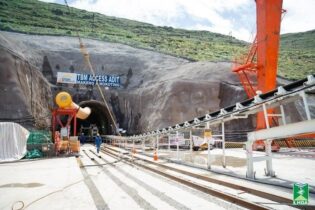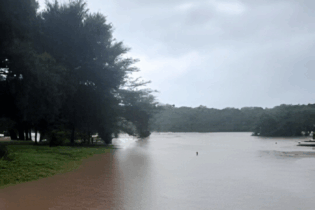Exceptional attention to plant design, construction and finishing, together with innovative solutions to environmental protection needs has resulted in a special product that is intended to be a heritage for the community served by the Drakenstein Municipality.
The new Meulwater Water Treatment Works (WTW) in Paarl is a plant with a difference. Situated in the Paarl Mountain Nature Reserve overlooking the Paarl valley, the Drakenstein Municipality required a system that would not only perform its primary task of treating water, but would also be environmentally friendly and aesthetically pleasing to ensure that the sensitive ecology of the area was disturbed as little as possible. Bateman Africa, supported by its technology partner, Tenova Bateman Technologies, was the main contractor for the mechanical and electrical works, engineering and supplying all equipment to suit the civil structures that were constructed under a separate contract. The treatment capacity of the works is 8 Mℓ/d and is upgradable to 15Mℓ/d.The treatment process has been optimised to suit the relatively good raw quality of mountain water. The WTW has also been designed to allow future incorporation of an additional dissolved air flotation process within the existing filters, should the water quality deteriorate. This is a possibility considering the relatively poor quality of the Berg River water that will supplement the mountain water. The process is one of direct-filtration and comprises chemical dosing equipment, flocculation, rapid gravity filtration and disinfection. Facilities for recovering spent backwash water have also been included. “This system returns most of the spent wash water to the head of the works for retreatment, which substantially cuts water losses,” says Richard Miles, Bateman Africa project manager. He states that the plant inlet control valve and the filter outlet control valves are electrically controlled and modulate according to requirements set by the plant operator via the SCADA control system. The plant has a 200 kW back-up generator system to ensure that there is continuous power to site. The Meulwater plant was originally proposed in 2001 after the Drakenstein Municipality identified the need to secure its own reliable water source and, the project was given the go-ahead after a comprehensive environmental impact assessment (EIA), which was carried out between 2001 and 2006. When the Department of Environmental Affairs and Development Planning (DEADP) approved the project, a number of requirements were stipulated regarding the size and appearance of the plant, noise levels and the overall impact on the environment. Miles says that as a result, the project had a number of unique challenges. “All mechanical and electrical equipment needed to comply with a set of very strict requirements and the fact that we were able to achieve what we did, thereby contributing further to these ideals, is testament to our systems and teamwork.” “For example, almost anything that gets wet – such as pipework, valve internals and fasteners – is made of stainless steel, which also helps minimise maintenance requirements. We have also placed acoustic doors on the machine room, both internally and externally, in order to minimise the plant’s noise impact,” he says. The DEADP requirements included instructions to limit the aesthetic impact of the structure by blending it into the natural environment. To achieve this, the plant was set as low into the ground as possible, sitting up to 5.5 m deep into the ground in places, displacing 1 500 t of granite. Almost half of the displaced granite was retained on-site for use as cladding to the outside of the main buildings.Sections of the structure are built completely underground and are planted with fynbos, and landscaping of the site was done in such a way as to limit visibility of the structure from the valley below. Trees have been placed strategically to hide aspects of the structure and, where possible, berms have been created to make the structure more discreet. The Drakenstein Parks department has helped the landscaping subcontractor gather seeds from various reserves, which were used to reseed all areas impacted by construction activities.
The Meulwater plant has undergone full equipment testing, and handover to the municipality took place at the end of June 2012, with strict adherence to safety, health and environmental requirements being a prerequisite. No injury or safety related incidents occurred throughout the entire contract period. Bateman Africa, the BBBEEarm of global company Tenova Mining & Minerals, provides first class project management services to its South African clients. Tenova Bateman Technologies offers differentiated, project-specific process technology solutions based on decades of establishing processing facilities. Advanced hydrometallurgical solutions include solvent extraction, electrowinning and leaching, supported by expertise in complementary processes from sulphuric and phosphoric acid plants, ion exchange circuits, water and wastewater treatment plants through to beneficiation processes for phosphate rock, base and precious metals, iron ore, coal and uranium. Pioneering the concept in the 1960s, Modular Plants offer competitive processing and reduced risk in difficult locations. Project accolades The project recently achieved the award for Best Project with a value under R50 million at the Consulting Engineers South Africa’s (CESA) Aon Engineering Excellence Awards, the Best Environmental Project award at the Institute of Municipal Engineering of Southern Africa (IMESA) Awards, as well as a Certificate of Merit from the Drakenstein Heritage Foundation. Aurecon has also recently walked away with one of the construction industry’s top accolades at the 2012 Construction World Best Projects Awards, as the highly acclaimed Meulwater WTW was named the ‘Overall Winner’ in the Professional Services category.





